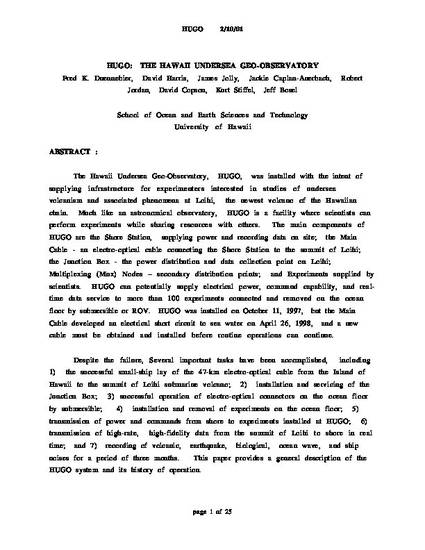
- Hawaii Undersea Geo-Observatory,
- HUGO,
- Loihi,
- Undersea volcanism
- Geology and
- Volcanology
The Hawaii Undersea Geo-Observatory, HUGO, was installed with the intent of supplying infrastructure for researchers interested in studies of undersea volcanism and associated phenomena at Loihi, the newest volcano of the Hawaiian chain. Much like an astronomical observatory, HUGO is a facility where scientists can perform experiments while sharing resources with others. The main components of HUGO are the shore station, supplying power to the observatory and recording data; the main cable-an electro-optical cable connecting the shore station to the summit of Loihi; the Junction box-the power distribution and data collection center on Loihi; multiplexing (mux) nodes-secondary distribution points; and experiments supplied by scientists. HUGO can potentially supply electrical power, command capability and real-time data service to more than 100 instruments connected and removed on the ocean floor by submersible or ROV. HUGO was installed on October 11, 1997, but the main cable developed an electrical short circuit to sea water on April 26, 1998, and a new cable must be obtained and installed before routine operations can continue. Despite the failure, several important tasks have been accomplished, including: 1) the successful small-ship lay of the 47-km electro-optical cable from the Island of Hawaii to the summit of Loihi submarine volcano; 2) installation and servicing of the Junction box; 3) successful operation of electro-optical connectors on the ocean floor by submersible; 4) installation and removal of experiments on the ocean floor; 5) transmission of power and commands from shore to experiments installed at HUGO; 6) transmission of high-rate, high-fidelity data from the summit of Loihi to shore in real time; and 7) recording of volcanic, earthquake, biological, ocean wave and ship noises for a period of three months. This paper provides a general description of the HUGO system and its history of operation.
This version is the author's post-referring copy. The published version can be found at http://ieeexplore.ieee.org/xpl/articleDetails.jsp?arnumber=1002476
Available at: http://works.bepress.com/jacqueline_caplan-auerbach/3/

This version is the author's post-referring copy. The published version can be found at http://ieeexplore.ieee.org/xpl/articleDetails.jsp?arnumber=1002476